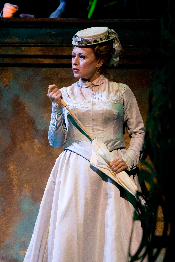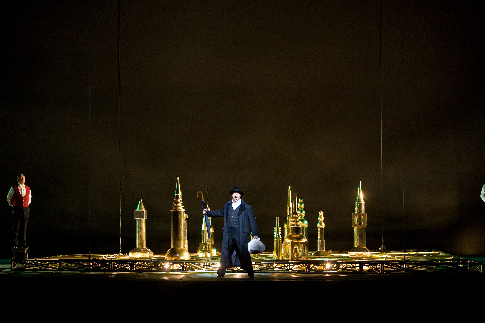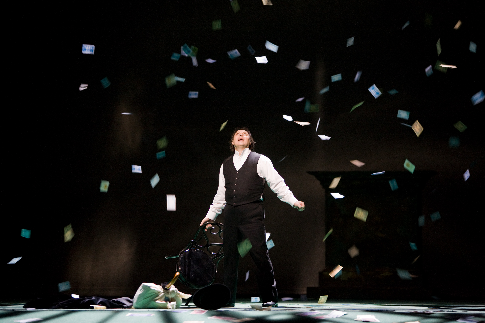
09 Apr 2008
Prokofiev's The Gambler at the MET
That Fed Dostoevsky – sure plays a mean pinball!
Plainly put, Frankfurt Opera’s “The Rape of Lucretia” could be offered as a textbook example of just how great a performance can be when everything goes right.
BERLIN — Which car-rental agency was it that was once No. 2 and “trying harder?”
In a climate in which bel canto opera seems to be enjoying a steady and welcome revival, ETO opened their current season with a welcome production of Donizetti's historically dubious account of the latter days of Anne Boleyn. The company's...
The most interesting opera on ETO's Spring 2008 tour was Carlisle Floyd's 1950s tale of religious hypocrisy in the rural Deep South, based on the Apocryphal tale of Susannah and the Elders.
The last of the three operas on ETO's Spring 2008 tour was sung in English, and updated to a Spain of the mid-twentieth century under Franco.
Opera companies often tout new productions as a major attraction of their seasons.
UC Opera's reputation for showcasing rare large-scale works has been boosted this year with the UK premiere of this 1846 opera by Edouard Lalo after a Schiller play.
As Anna Russell might say: "The three operas of Puccini's 'Il Trittico' take place on a luxury cruise liner. . . . . On it."
Let me say up front that I like Jake Heggie's work. I feel he has a true gift for soaring and meaningful melody, a great ear for orchestral effects, a talent for picking good source material, and a knack for crafting affecting melodrama (in the best sense of that word) that can move an audience to tears.
Do dysfunctional families outnumber the ones that move through life untroubled, or is it — to paraphrase Tolstoy — that every dysfunctional family is dysfunctional in its own way and thus of greater interest to writers and composers?
I bet this doesn't happen at the movies:
Let us, for one example among many, take the capstan song in Act I.
James Conlon has become the artistic heart and soul of Los Angeles Opera in his second season as music director.
The Opera Company of Philadelphia’s February production is the second staging of David DiChiera’s new opera Cyrano, a co-production with Michigan Opera Theater and Florida Grand Opera.
Opera North is one of the most innovative opera companies in Britain.
Perhaps the most beloved comic opera, Rossini’s Il barbière di Siviglia has never left the repertoire.
San Diego Opera apparently has raided the vaults of Lincoln Center opera companies, circa the 1970s.
The Royal Opera's new Salome is set roughly in the 1930s, in surroundings which refer overtly to Pasolini's Salò or the 120 Days of Sodom, populated by uniformed soldiers and naked whores.
Dread and disgruntle are the emotions natural to the fan of any special singer when he arrives at the opera house to learn she has withdrawn from the performance and been replaced by an unknown.
At the curtain call for the first night of WNO’s new production of the infrequently performed Khovanshchina director David Pountney wore a simple Russian shirt.

That Fed Dostoevsky – sure plays a mean pinball!
That version of a line from another opera I once saw at the Met expresses my initial reaction to the return of the elegant Temur Chkhedze production of Prokofiev’s The Gambler, based on the novella of addiction and social dysfunction set in a fictitious German casino spa much like the ones where Dostoevsky frittered himself into bankruptcy. In the Met production, Roulettenberg is not so much a green baize casino as a four-story-high pinball game, with great glass-and-metal towers to knock the balls back in, flashing and spinning, lights, exploding horses and fireworks, a twirling park for the characters to circle each other when not “in play,” and a crannied attic – which expands to the width of the stage as needed – for our eponymous gambler to spend his time driving himself nuts with unrequited passion, for both the lovely Polina and the equally whimsical game of roulette. It’s not money he’s after, really, this Alexei slouching aggressively around town (in Vladimir Galouzine’s mesmerizing, physical, merciless star performance), or even Polina, really – it’s the thrill – of beating the odds – every sort of odds – life’s odds – the class system’s odds – the odds of Fate. Since that particular house cannot be beaten, the story cannot end well. We hardly laugh when a bankrupt, lovelorn General fires a pistol into his own head – the gun isn’t loaded and he’s already dead.
Prokofiev’s opera is not melodious, even by the standards of his War and Peace, which swept us off our feet when the Met revived it in December. The Gambler has no big picture, no nations running riot on the stage, and no glorious off-kilter waltzes to set the sensual scene. It is a lithe, onomatopoeic score, a vehicle for a few great singing actors, and the story is tightly wound. Alexei, a typical poor Russian intellectual, works as a tutor in the family of a General, who has come to Roulettenberg, supposedly to take the waters but actually to barter his lovely stepdaughter, Polina, to a rich marquis in order to borrow enough money to win the hand of the lovely courtesan, Madame Blanche, meanwhile hoping his rich mother-in-law in Moscow will finally die and leave him her fortune. Tragically, the old lady is in fine health, comes to town herself, and loses sixty thousand at the wheel. Polina begs Alexei to acquire the money to save her from selling herself on the marriage market, and in the spectacular set piece of Act IV, he goes to the tables, breaks the bank and cleans out the town! Triumphant, he gives the money to his adored Polina – and she hurls it back in his face. Curtain.
 A scene from Prokofiev's "The Gambler" with Vladimir Galouzine as Alexei (center).
A scene from Prokofiev's "The Gambler" with Vladimir Galouzine as Alexei (center).
Prokofiev wisely simplified Dostoevsky’s ugly story. In the short novel, Blanche carries Alexei off to Paris to teach him how to spend (her great talent); but he enjoys nothing now except a gambler’s high, and returns to the casino a hopeless addict.
The shadiness of these figures is the point – notice that none of them are blood relations. In the 1870s, censors (and readers) would not have been able to endure a story in which people sell their children or parents for money, but stepchildren, adoptive parents and in-laws were fair game. Even forty years after the novel appeared, when Strauss, in Elektra, showed a family of blood relations hating each other, there was a scandal. Then Freud let the cat out of the bag about families.
The Met’s brilliantly staged, magnificently played, sparsely attended revival is the swan song of Valery Gergiev’s immensely distinguished far too brief career as the Met’s co-music director, a period that has introduced us to many wonderful, too-little-known Russian works with the cream of Russian singers and a mixed bag of Russian directors to put them over. It will immensely impoverish the Metropolitan, and the New York opera scene (thickly inhabited with Russians these days, by the way) if these works, and others we have not yet heard, vanish from the repertory and we resume mediocre revivals of the thrice-familiar.
Promenading about George Tsypin’s glamorous set these days (thrillingly lit by James F. Ingalls), besides the extraordinary Mr. Galouzine, who plays a crazed Russian as if he were, well, a crazed Russian (he’ll do it again in Pikovaya Dama next year, and you know? in Pagliacci, he was the scariest Canio I’ve ever seen); Olga Guryakova’s plum-shaped, sensuous tones as Polina; Larissa Diadkova as a far livelier (and audibly far easier to take) Grandma than Elena Obrastzova was; and a great horde of Kirov and Met regulars in smaller roles doing small but exciting things. This is one of those operas where one is very thankful for the Met titles, as we would otherwise miss a lot even if we were fluent in Russian (and I’m not).
 A scene from Prokofiev's "The Gambler" with Vladimir Galouzine as Alexei.
A scene from Prokofiev's "The Gambler" with Vladimir Galouzine as Alexei.
An evening of theater at the Met that will wake you up.
John Yohalem